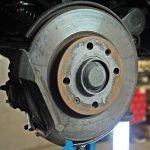
Don’t Panic
The first thing to remember when your brakes fail is that there are solutions to this situation. Panicking can result in poor decision making and poor reaction times when these types of emergencies occur. By keeping your cool, you can respond appropriately to the driving situation and protect yourself and your fleet vehicle from serious damage.
Shift into Low Gear
Downshifting can slow your vehicle and allow you a greater measure of control when your brakes fail. Lower gears can reduce your speed naturally. Avoid downshifting too rapidly, however; this can lead to skidding that could limit your ability to steer during these emergency situations.
Put on Your Hazard Lights
Alerting other drivers to your emergency can help them to avoid your vehicle as you try to slow and stop it. Keeping other vehicles at a safe distance is essential to reduce the risk of accidents.
Pump Your Brakes
If your brake failure is due to a loss of fluid in your system, you may be able to gain some stopping power by pumping your brakes slowly and steadily. Repeated application of your brake pedal may allow pressure to build up in your system to provide added help in stopping your car, truck or other vehicle.
Apply the Emergency Brake
Depending on the type of emergency brake in your vehicle, either press down on the pedal or raise the brake handle slowly. This can often provide adequate braking power for vehicles traveling at lower speeds and may offer some help for faster-moving cars and trucks.
Pull Over
Carefully pulling over to the side of the road or to the curb can allow you to use friction to slow down your vehicle and can provide added protection against collisions with other drivers on the road. This can be especially critical for larger trucks and delivery vehicles with heavy loads.
An Ounce of Prevention
Testing the brakes of your fleet vehicle every time you get behind the wheel can help you to identify minor issues before they become major problems. Static brake testing involves applying the brakes while at a complete stop. If the brake can be easily pushed all the way to the floor, checking brake fluid levels is essential to ensure safety on the road. Rolling brake tests, as the name implies, are performed while the vehicle is in motion at a relatively low rate of speed.
At Glesby Marks, we specialize in commercial fleet leasing and management services that suit the way your company does business. Our commercial vehicle leasing team can provide you with the most cost-effective solutions for your transportation needs and can ensure that your fleet vehicles are maintained to the highest industry standards. To learn more about the Glesby Marks difference, call us today at 1-800-482-9498. We look forward to providing you with the services you need to succeed in the fast-paced world of modern transportation, repair and delivery services.
